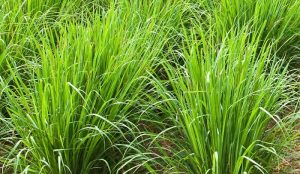Palmarosa essential oil is from Palmarosa, a grass plant similar to lemongrass and citronella. It has a strong, spicy and pepper-like aroma, with an earthy and herbaceous character. Palmarosa essential oil is good for rediscovering emotional strength & stamina, alertness, and higher energy.
Palmarosa essential oil is steam-distilled from the plants’ leaves and flowers, whether fresh or dried.

Uses of Palmarosa Essential Oil for the Body
Palmarosa is antiseptic, febrifuge (can lower fever), digestive, stimulant, and cicatrisant (helps skin heal by forming scar tissue).
It is often added to cosmetics and skin care products and is gentle enough for most skin types but especially useful for dry skin. It can help with conditions such as acne and acne scars and aid with the growth of new cells. This cytophylactic property makes it useful for treating aging skin and wrinkles. It can also be used as an insect repellent.
The Palmarosa plant can help to relieve high fever temperatures and flu symptoms. A few drops of the oil into a teaspoon of carrier oil can be gently massaged on the shoulders and the temples to cool down temperature and make you feel better when you’re struggling with fever and the flu. Because it is antibacterial and antiseptic, the plant can also be used to disinfect wounds.
Palmarosa Oil is also used to treat problems such as thrush and other conditions that affect the genito-urinary tract.
Uses of Palmarosa Essential Oil for the Mind
Palmarosa is a useful oil for relieving stress and nervous exhaustion. It can be used in massages and baths or diffused during stressful times.
Palmarosa Essential Oil Relieves Depression And Stress Caused By:
- Nervousness
- Insecurity
- Resistance to change
- Attention-seeking behavior
Palmarosa in Ancient History
The Palmarosa plant is used in India to relieve fevers, treat infectious diseases, and help with nerve pain and rheumatism.
Palmarosa in Modern History
Palmarosa oil distillation began in the 18th century. The plant came from India to Turkey and Bulgaria, where the essential oil was (and still is) used to adulterate the expensive Turkish rose oil. Today, Madagascar produces some of the best Palmarosa essential oil, although India also produces large quantities.
According to Gabriel Mojay in Aromatherapy for Healing the Spirit, p. (120-121), the dried herb and essential oil have been used in the traditional Indian medicine known as Ayurveda. The oil is used for rheumatic pain, lumbago, neuralgia and sciatica and the herb is used for fevers, dyspepsia and colitis.
Mojay writes:
” Palmarosa is helpful for dry, undernourished skin conditions. On the other hand, its cooling, anti-inflammatory nature makes it applicable for dermatitis, eczema, and psoriasis: while the oil’s antibacterial, -viral and -fungal properties make it indicated for a wide range of skin infections, including boils, shingles, and mycosis (fungal infections).
Combined with lavender, tea tree, and geranium oils, Palmarosa essential oil can also help clear genito-urinary infections, such as cystitis, urethritis and vaginitis.”
Palmarosa Essential Oil Cautions
Note that Palmarosa is often used to infuse rose oil because of the high cost of producing rose essential oil. Further confusion comes from Palmarosa being sometimes called Indian geranium or Turkish geranium.
When buying Palmarosa oil, make sure it is Cymbopogon martini and not diluted with any other oils.
Palmarosa essential oil itself is sometimes infused with oils from same botanical family: lemongrass (Cymbopogon citratus) and citronella (Cymbopogon nardus).


